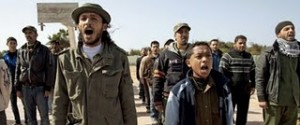Since civil war broke out almost five months ago, Libya has been all over the news. There have been both intranational and international efforts to take down Muammar Gaddafi, who has been the leader of Libya since 1969, but none have been successful. As Gaddafi attempts to maintain his rule, the international community has taken drastic measures to limit his resources and cripple his power. However, sanctions have caused stocks of food and medical supplies to drastically deplete, leaving Libyans – quite literally – starving for peace.
In times of peace, Libya exports almost two billion barrels of oil per day, which gives the government enough revenue to buy food and distribute it to its citizens. Because of the war, however, sanctions prevent these oil exports from taking place, leaving Libya without the funds to provide its citizens with enough food and supplies. Though not urgent (yet), this situation is worsening quickly, and there are currently no plans to restock the nation of vital food and supplies. In other words, among the numerous bombs going off in Libya, this has become somewhat of a ticking time bomb itself.
Diminishing medical supplies also causes great concern for the increased possibility of disease. With depleting polio vaccinations, for example, comes the greater concern of a polio outbreak. This could obviously become catastrophic to a state already experiencing a shortage of food, medical supplies, governmental support, and many other necessary resources.
Too often in conflict, two main groups are the focus: those who win and those who lose, those who support a cause and those who oppose it, and in Libya’s case, those who are pro-government and those who are pro-revolution. But in the battles between two opposing groups, there are always those who get stuck in the crossfire – those who are affected by the conflict by default. The innocent – and oftentimes neglected – civilians. War certainly has many casualties; that is no secret. But some of the most tragic stories occur because of war’s ripple effect – the indirect damage that conflict can cause. Many Libyans who have had no direct part in this conflict are at an extremely high risk of suffering from hunger and disease. With an unstable government and insufficient international aid, they’re pretty much forced to wait it out until this conflict is resolved. And, unfortunately, this is only a minor ripple in war’s enormous wake.
those who support a cause and those who oppose it, and in Libya’s case, those who are pro-government and those who are pro-revolution. But in the battles between two opposing groups, there are always those who get stuck in the crossfire – those who are affected by the conflict by default. The innocent – and oftentimes neglected – civilians. War certainly has many casualties; that is no secret. But some of the most tragic stories occur because of war’s ripple effect – the indirect damage that conflict can cause. Many Libyans who have had no direct part in this conflict are at an extremely high risk of suffering from hunger and disease. With an unstable government and insufficient international aid, they’re pretty much forced to wait it out until this conflict is resolved. And, unfortunately, this is only a minor ripple in war’s enormous wake.
It makes me wonder: does anyone ever really win?
What do you think about the ripple effects of war? Can you think of any other consequences that Libyans are experiencing because of the current conflict?
Rebecca Birnbaum is a Program and Research Intern with the SISGI Group focusing on nonviolent conflict resolution, nonprofit management, and sustainable development. She is a senior at the University of Michigan, where she studies Anthropology, Political Science, and Peace and Social Justice. To learn more about the SISGI Group, visit www.sisgigroup.org.

